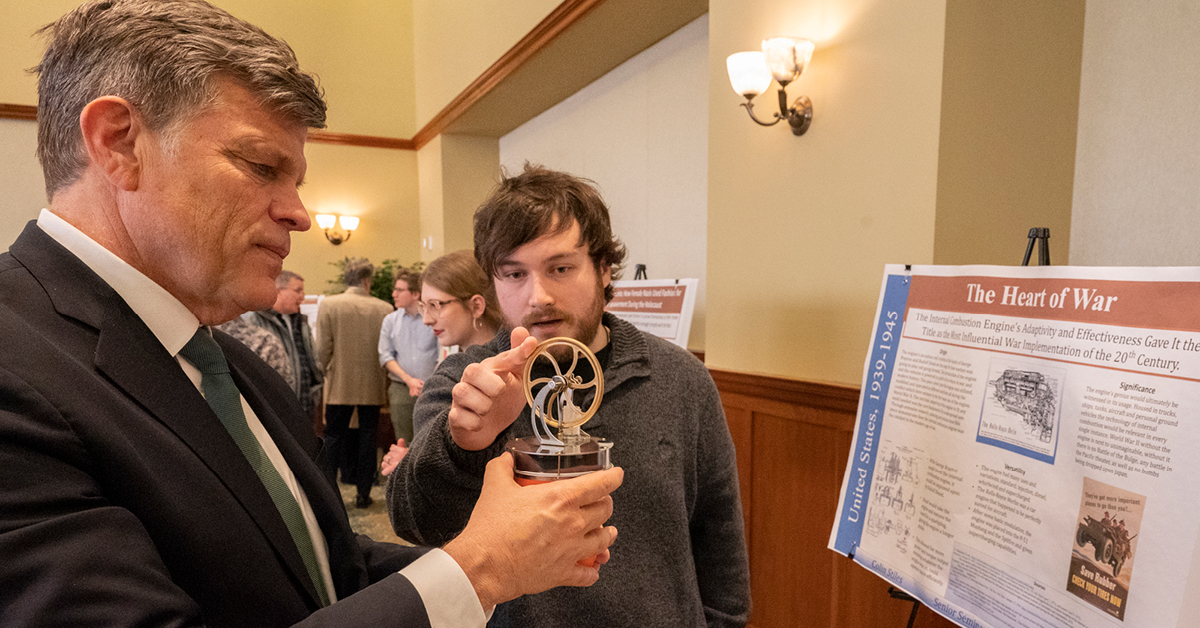From CNN to Rowan: Presidential historian Douglas Brinkley talks Nixon, Watergate and politics
From CNN to Rowan: Presidential historian Douglas Brinkley talks Nixon, Watergate and politics

Presidential politics—and, most especially, the Nixon years---took center stage at Rowan University on March 28 as renowned historian and author Douglas Brinkley presented a talk as part of the University’s President’s Lecture Series.
In an engaging, entertaining lecture before full audience in the Eynon Ballroom of the Chamberlain Student Center, Brinkley, CNN’s presidential historian, presented “Nixon, Watergate and Presidential Politics.”
“Nixon is not always everybody’s favorite topic. He’s a pariah figure,” Brinkley said of the nation’s 37th president, who resigned in disgrace due to his involvement in the Watergate scandal.
Fifty years ago, on June 17, 1972, five people were arrested for breaking into and wiretapping the Democratic National Committee headquarters at the Watergate Complex. The break-in was traced back to the Committee for the Re-election of the President (CREEP), a fundraising organization for Nixon’s 1972 re-election campaign.
Facing three articles of impeachment, Nixon resigned in 1974 shortly after the Supreme Court ruled that the president’s own taped recordings, which revealed his attempts to cover up CREEP’s involvement in the break-in, were not subject to executive privilege.
A ‘square’ politician
The irony of Watergate, in many ways, is that Nixon did not need the assistance of the wiretaps to win the ’72 election, said Brinkley, author of the two-volume annotated The Nixon Tapes.
After losing in his first presidential bid to John F. Kennedy in 1960, which, to his credit, he accepted, Brinkley said, Nixon, a Republican, was elected in 1969 at the end of a turbulent decade of change.
“He was the most ‘square’ politician you could invent,” Brinkley said of Nixon, America’s first president from California.
Nixon was president when the United States landed on the moon. He “pulled the economy together,” Brinkley said, and established the Environmental Protection Agency. In 1972, he became the first president to visit the People’s Republic of China, meeting with Chinese Communist Party Chairman Mao Zedong.
“It was big…epic,” Brinkley said of the China visit, which demonstrated Nixon’s diplomacy. “I would not call him a political failure in ’69, ’70 and ’71.”
In 1971, Nixon began tape recording as a means to preserve his legacy and have a record of his own perceived “greatness,” Brinkley said. Enamored with British Prime Minister Winston Churchill, Nixon was intent on writing a five-volume set detailing his life and presidency, Brinkley said. The tapes were his record.
“He wanted,” the historian noted, “to be like Churchill.”
A complex figure
Nixon’s legacy can never be rehabilitated and he is widely considered one of the nation’s worst presidents, Brinkley said. In 1969, Nixon failed to get the U.S. out of the Vietnam War and, in fact, his illegal order to invade Cambodia in 1970 further fueled the American anti-war movement, according to Brinkley.
“He will never be able to rehabilitate himself in history,” said Brinkley. The Nixon tapes, he said, were full of “endless racist, anti-Semitic rants…all day long.
“He’s always going to be seen as one of the worst presidents. Clearly, there was a dark, paranoid side of Nixon. He’s a complex figure.”
Historians and citizens, Brinkley said, generally agreed that Watergate, which he deemed a “keystone cops kind of thing,” was a watershed moment for the U.S.
“Watergate really jarred the country,” Brinkley said. After Nixon resigned, there was a sense that “our government works,” Brinkley noted. “We persevered over Nixon.”
Sharing research
A contributing editor to Vanity Fair, Brinkley is the Katherine Tsanoff Brown Chair in Humanities and professor of history at Rice University.
Six of his books have been named “Notable Books of the Year” by the New York Times, while seven others have been New York Times best sellers. His works include books on Jimmy Carter, Ronald Reagan, Henry Ford, Theodore Roosevelt, Rosa Parks and Walter Cronkite, among many others.
The Nixon Tapes won the Arthur S. Link-Warren F. Kuehl Prize from the Society for Historians of American Foreign Relations.
During a whirlwind day and a half on Rowan’s campus, Brinkley met with students and faculty; toured historic Hollybush Mansion, the site of the 1967 summit between President Lyndon B. Johnson and Soviet Premier Alexei Kosygin during the Cold War; and attended a poster session featuring student research.
Brinkley said he enjoyed learning from the students.
“Guys, these are all super interesting,” Brinkley said of the student posters, which focused on numerous historical topics, including genocide in the LBGT community, bias and the foundations of international law in the Philippines, disinformation surrounding the Chernobyl disaster, Holocaust trauma passed down through generations, trench warfare, and the importance of the internal combustion engine as a war implementation during the 20th century.
“I’ve had a bit of a magical time here,” Brinkley continued. “I’ve learned a lot.”
Brinkley’s President’s Lecture Series talk was sponsored by the Office of the President, the College of Humanities & Social Sciences, the Department of History, the College of Communication & Creative Arts, the Rowan Institute for Public Policy & Citizenship, and the Department of Political Science & Economics.
Doris Kearns Goodwin, Cornel West, Stephen Jay Gould, Jonathan Kozol, Scott Sagan, Sergei Khrushchev, and Dan Rather are among those who have presented President’s Lecture Series talks at Rowan.